
Breadcrumbs navigation
The latest in IR - winter book round up
elcome to our quarterly book round up. Each quarter we bring you updates on the latest International Studies releases by BISA members. To be included in the next update contact Communications Manager, Chrissie Duxson: Chrissie.Duxson@bisa.ac.uk
A Leader-Centered Theory of Foreign Policy Change
U.S. Foreign Policy toward Cuba under Obama
Klaus Brummer

Klaus Brummer is Professor of International Relations at the Catholic University of Eichstätt-Ingolstadt. He served as co-editor-in-chief of the journal Foreign Policy Analysis (2018–2020) and was president of the foreign policy analysis section of the International Studies Association (2015–2016).
Blurb
Foreign policy analysis is a major part of international relations scholarship, yet many models are ill-equipped to examine the effects of individual leadership on policy. Written by a leading figure in the field, this innovative account challenges traditional views in international relations by theorising the influence of individual leaders on foreign policy change. It examines how and why leaders have shaped policy throughout history, showcasing Obama's Cuba pivot as a prime example.
Using an original theoretical approach, this book will appeal to academics and practitioners in foreign policy analysis, international relations and comparative politics.
Find out more and purchase the book via the Bristol University Press website
Prioritizing Global Responsibilities
Luke Glanville and James Pattison
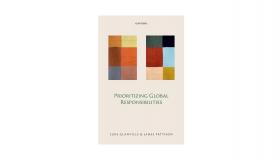
Luke Glanville is Professor of International Relations at the Australian National University. He is the author of several books including Sharing Responsibility: The History and Future of Protection from Atrocities (Princeton University Press, 2021) and Sovereignty and the Responsibility to Protect: A New History (University of Chicago Press, 2014).
James Pattison is Professor of Politics at the University of Manchester. His publications include The Alternatives to War: From Sanctions to Nonviolence (OUP, 2018), The Morality of Private War: The Challenge of Private Military and Security Companies (OUP, 2014), and Humanitarian Intervention and the Responsibility to Protect: Who Should Intervene? (OUP, 2012).
Blurb
States face multiple ongoing and emerging challenges, from climate change to global disease, mass atrocities to forced displacement, humanitarian crises to entrenched global poverty, and are constrained by material and political limits to the amount of resources that they can devote to these issues. How should states decide which issues to prioritize and which crises to address?
Prioritizing Global Responsibilities answers this question by proposing a two-level account of just prioritization that aims to be both philosophically sound and practically relevant. The authors assess several potential prioritization principles, including diversification, culpability, urgency, disadvantage, and national interest, and argue that states should prioritize issues where they can assist most effectively and where they can help those who are most underprivileged.
Find out more and purchase the book via the Oxford University Press website
Affective bordering
Race, deservingness and the emotional politics of migration control
Billy Holzberg

Billy Holzberg is Assistant Professor of Social Justice at King's College London.
Blurb
Affective bordering is a powerful exploration of the emotional politics of borders that demonstrates how racial and national boundaries are secured through the political mobilisation and unequal distribution of affect. Examining key events in the wake of the 'refugee crisis' in Germany, it traces how the initial hope and empathy of the long summer of migration of 2015 gave way to national anger, fear and shamelessness in the years following. Challenging the assumption that positive emotions like compassion necessarily work as a counter to negative emotions like anger or fear, the book reveals the racial grammars of deservingness that shape border governance today. Combining queer feminist theories of affect with postcolonial border and migration studies, Affective bordering offers a thought-provoking perspective on borders in today's world.
Find out more and purchase the book via the Manchester University Press website
Reconceptualizing Securitization in Afghanistan
Ethnicity, Social Identity, and Higher Education post-2001
Arif Sahar and Christian Kaunert
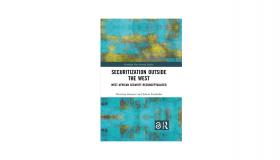
Christian Kaunert is Professor of International Security at Dublin City University, Ireland, and Professor of Policing and Security, as well as Director of the International Centre for Policing and Security at the University of South Wales. He is the author/editor of twenty books, including, most recently, Securitization Outside the West (2022).
Blurb
This book analyses the securitization of ethnic identities and social groups by the state in Afghanistan in the post-2001 context.
Securitization is arguably the most successful theoretical framework to analyse security beyond the military confines. Yet, despite its broadening agenda, the securitization framework has been accused of a Western bias. This book analyses the extent and the modalities and practices of the securitization of ethnic identities and social groups (e.g. women) by the state in Afghanistan post-2001, which is especially relevant following the takeover by the Taliban in August 2021. It puts forward a more nuanced argument by analytically distinguishing and empirically testing state policies, practices, and perspectives on ethnic and social groups that are largely informed by the fear and legacies of civil war (1978–2001). The work argues that the traditional lack of a stable state identity that could function as a basis for ontological security in Afghanistan has resulted in a persistent state of fragility exacerbated by the legacies and fears of civil war that have had a direct impact on the development of the state’s perspectives on ethnic and social groups. Whilst the state does not necessarily indulge in explicit securitization practices and discourses, securitization often takes place through implicit activities to undermine ethnic and social groups’ ability to enter political, economic, and socio-cultural competitions fairly and equitably, which would, in turn, enable these groups to challenge the state. The securitization process, therefore, has had an impact on the ability of these groups to benefit from opportunities fairly and equitably.
Find out more and purchase the book via the Routledge website
The Nationalisation of UK Aid and Development
The End of Aid?
Melita Lazell and Ivica Petrikova
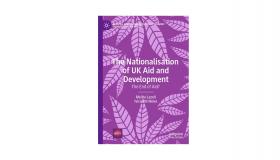
Melita Lazell is Associate Professor in Political Economy and Development, and Associate Head of the School (Research) for Area Studies, Sociology, History, Politics and Literature, University of Portsmouth, UK.
Ivica Petrikova is Senior Lecturer in Politics and International Relations at Royal Holloway University of London, UK and co-director of the Global Politics and Development Centre.
They are both conveners of the BISA Global Politics and Development Working Group.
Blurb
Since the creation of the Department for International Development, the purpose of UK development policy and aid has changed significantly. This book provides a comprehensive evaluation of these changes, their causes, and their implications. It argues that UK development aid as an act of solidarity, economic justice, or redistribution, which has always been undermined by donor interest and colonialism, has been abolished. The authors present a new framework for understanding the UK’s current approach to development policy and aid, the ‘nationalisation’ of aid, which prioritises narrow domestic commercial and political interests at the expense of sustainable development and the UK’s international reputation. Based on new quantitative and qualitative data, the book offers a nuanced and comprehensive exploration of the UK's approach to aid and development, contributing to broader discussions on the evolving nature of development assistance and its implications. With a combination of rigorous research methods and insightful analysis, it not only advances scholarly understanding within the fields of Politics, International Relations, Development Studies, and International Political Economy, but also provides practical guidance for policymakers and practitioners seeking to navigate the complexities of contemporary development assistance.
Find out more and purchase the book via the Springer website
International Organizations and Peaceful Change in World Politics
Edited by T. V. Paul, Anders Wivel and Kai He
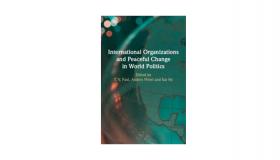
T.V. Paul is James McGill Professor of International Relations in the Department of Political Science at McGill University, Montreal, and a Fellow of the Royal Society of Canada. He is the Founding Director of the Global Research Network on Peaceful Change (GRENPEC).
Blurb
International organizations play an important, if imperfect, role in world politics, solving collective action problems in security, economic, environmental, and global health among others. While many believe that international organisations have formed critical pillars of global governance, sceptics contend that they reflect the power politics of the day and the interests of hegemonic powers. This volume examines whether international organizations contribute to or detract from peaceful change, acting as agents of both status quo and stasis. Providing a historical overview of international organizations, from the nineteenth century to the current day, a team of leading scholars offer an overview of how major theoretical approaches – Liberalism, Constructivism, Rationalism and Realism – have contributed to our understanding of the role played by international organizations in peaceful change. In particular, the roles of the United Nations General Assembly, UN Peacekeeping, UN Environment Program, World Health Organization, World Trade Organization and G20 are analysed.
Find out more and purchase the book via the Cambridge University Press website
The Unfinished Quest
India's Search for Major Power Status from Nehru to Modi
T.V. Paul

T.V. Paul is James McGill Professor of International Relations in the Department of Political Science at McGill University, Montreal and a Fellow of the Royal Society of Canada. He served as the President of the International Studies Association (ISA) for 2016-17. He is also the Founding Director of the Global Research Network on Peaceful Change (GRENPEC). Paul is the author or editor of 22 books, co-editor of 4 special journal issues, and author of over 80 scholarly articles and book chapters in the fields of International Relations, International Security, and South Asia. Paul currently serves as the editor of the Georgetown University Press book series, South Asia in World Affairs.
Blurb
In The Unfinished Quest, T.V. Paul charts India's checkered path toward higher regional and global status, and sheds important light on its significance as the "swing power" that can mitigate China's aggressive rise in the Indo-Pacific region.
In 2022, India surpassed the United Kingdom, its former colonial ruler, as the fifth largest economy in the world. Since the 1990s, a series of US presidents and secretaries of state have all acclaimed India as a rising major power that deserves to be recognized as a lead actor in the international arena. All five permanent members of the UN Security Council except China have openly acknowledged the need to include India among their ranks. But even now, India has not attained the status of a globally recognized great power.
In The Unfinished Quest, leading international relations and South Asia scholar T.V. Paul charts India's checkered path toward higher regional and global status, covering both the successes and failures it has experienced since the modern nation's founding in 1947. Paul focuses on the key motivations driving Indian leaders to enhance India's global status and power, but also on the many constraints that have hindered its progress. He carefully specifies what counts as indicators of greater status and uses these as benchmarks in his assessment of each era. In this manner, he also brings forth some important insights on status competition and power transitions in the contemporary international system.
Find out more and purchase the book via the Oxford University Press website
Security in Crisis
Planetary Emergence and the Technopolitics of Crisis Management
Columba Peoples

Columba Peoples is Associate Professor in International Relations in the School of Sociology, Politics and International Studies (SPAIS) at the University of Bristol.
Blurb
Security in Crisis seeks to provide an analysis of the complex combinations of political and technological understandings entailed in what it terms as 'planetary crisis management'. Arguing that the emergence, scope and scale of planetary insecurity and crisis management challenge traditional disciplinary boundaries of the study of International Relations and security, the book adopts an interdisciplinary outlook. It integrates ideas and approaches from across political theory and anthropology (on conceptions of crisis) including climate science and the wider study of environment and ecology in the 'Anthropocene' (on planetary insecurities and ideas of geoengineering); science and technology studies (on the 'technopolitics' of crisis management and the 'sociotechnical imagination' of planetary futures); and critical security studies (on critical approaches to the international and to security). In the process, the book considers how technopolitical 'fixes' for planetary crisis and emergency are often bound up with vexed questions of who 'we' are, and what it means to imagine and secure a planetary future.
Find out more and purchase the book via the Oxford University Press website
De Gruyter Handbook of Drone Warfare
Edited by James Patton Rogers

James Patton Rogers is the Executive Director of the Cornell Brooks Tech Policy Institute at Cornell University and the NATO Country Director of the Full Spectrum Drone Warfare project, supported by NATO SPS. An expert on drones, disruptive technologies, and the history of weaponry and strategy, James has worked with the UN Security Council, UNOCT, and UNCTC (amongst others). He is the author of ‘Precision: A History of American Warfare’ (Manchester, 2023). He is also the co-convener of the BISA War Studies Working Group.
Blurb
In 2010, 60 states had a military drone program. Today at least 113 countries and 65 non-state actors now have access to weaponized drone technologies. Alongside this, established ‘drone powers’ – the U.S., China, Turkey, and Iran – have expanded their own use of military drones, increasing the sale and deployment of drones around the world. In the De Gruyter Handbook of Drone Warfare, drone expert, policy adviser, and historian, Dr James Patton Rogers, brings together 37 of the world’s leading voices on the growing issues of commercial and military drone technologies.
From the origins of military drones in the early 1900s and the resurgence of drone use during the War on Terror, through to the global proliferation of drones across Europe, Africa, and the Middle East, this handbook explores the moral, ethical, technological, legal, military, geopolitical, social, and strategic issues at the heart of drone warfare. The first handbook of its kind, the volume also addresses Russia’s offensive war against Ukraine, the rise of Iranian and Houthi drones, and provides a focused analysis of the future of drone warfare and the opportunities and perils of AI, autonomy, and swarming technologies in the coming Third Drone Age.
Find out more and purchase the book via the De Gruyter website
The Oxford Handbook of NATO
Edited by James Sperling and Mark Webber
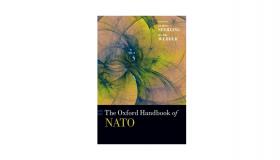
Mark Webber is Professor of International Politics at the University of Birmingham. He was Head of the School of Government at Birmingham from 2011 to 2019 and Chair/Honorary President of the British International Studies Association (BISA) from 2019 to 2023. He is a non-resident fellow at the NATO Defence College in Rome.
Blurb
The North Atlantic Treaty Organization (NATO) has since its foundation in 1949 been the principal body of the Western security order, and remains as important in the 2020s as it was in the 1950s. This Handbook offers the most extensive treatment of the Alliance published in the last two decades, providing detailed coverage of NATO allies, policies, and organizational structures. It brings together internationally renowned scholars who interrogate NATO's actions from historical, theoretical, and empirical perspectives.
The Handbook is divided into nine parts. Following an introductory part offering a thematic overview of NATO, framed by different approaches to domestic politics and global order, the second part explores three broad questions - what is NATO for, who is NATO for, and whither NATO? Part Three is more expressly theoretical, providing multi-perspectival analyses of the Alliance. Part Four then turns to how NATO works as a political-military alliance. Parts Five and Six are concerned with what NATO does in practical terms - how it addresses a wide range of security threats and what operations it has mounted in response. Part Seven looks at some of NATO's most significant allies including France, Germany, Italy, Poland, Turkey, the United Kingdom, and the United States. Part Eight, meanwhile, is concerned with partnerships and key relationships beyond NATO's membership - looking at Australia, Georgia, Ukraine, Russia, China, the European Union, and the European neutrals as well as ties to states in the Gulf, the Middle East, and North Africa. The final part of the volume offers reflections on NATO's recent past and possible lines of future development.
Find out more and purchase the book via the Oxford University Press website
If you're a BISA member and you'd like your book included in next quarter's round up, email Communications Manager, Chrissie Duxson: Chrissie.Duxson@bisa.ac.uk. Please include the title, blurb and a link to where the book can be purchased. If you are able, you can also include details of any discount available, but of course this is not required. The book should have been published a maximum of six months prior to your email.
Top photo by Phil Hearing on Unsplash